How Does the Instagram Algorithm Work in 2021?

Launched more than a decade ago in October 2010, Instagram was an instant success, with 25,000 people signing up the very first day, and 1 million users creating accounts by December of that year. A month later Instagram introduced hashtags and opened “the service up to brand campaigns,” and as the saying goes, the rest is #history.
With 70% of shopping enthusiasts relying on Instagram to discover new products, and 90% of people on Instagram following at least one business, the “why” of brands being active on the platform was answered millions of users ago. But it’s the “what” and “how” to reach that audience that still very much require the attention of creators and advertisers as they seek out the best ways to reach Instagram’s impressive user-base.
Making Your ‘Mark’ On Instagram
“Warren got a billion, Mark got a billion, Dre got a billion, I just want a billion (billion).” – Jeezy
While we haven’t interviewed rapper Jeezy to confirm, we’re assuming the “Mark” referenced in Billions is the owner of Facebook, WhatsApp, and Instagram – Mark Zuckerberg. In August 2020, Mark Zuckerberg officially became a centibillionaire as his net worth reached $100 billion. But dollars aren’t the only billions that make up Zuckerberg’s wealth – billions of users is also a valuable measure of his empire.
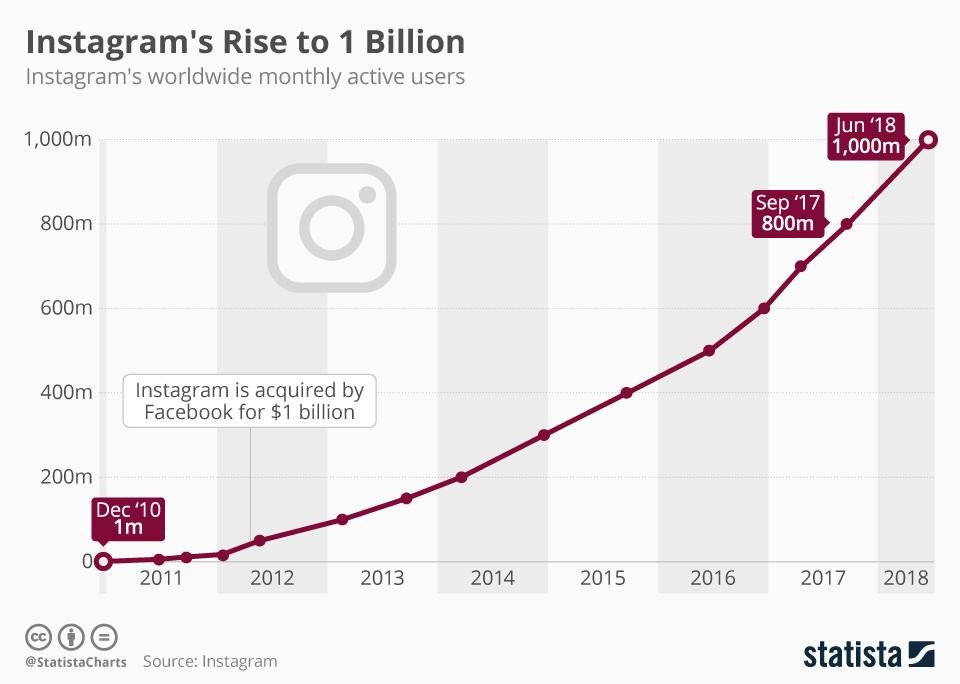
In the above chart from Statista.com, we see that Instagram hit the billion-user mark in June 2018, 8 years after being acquired by Facebook for $1B.
So, how do you reach your fair share of Mark’s billions of users? By feeding Instagram and other social media algorithms the content users are most hungry for.

In its simplest terms, an algorithm is a formula – or set of instructions or rules – that is followed to complete a process as those rules intended. When discussing social media algorithms in particular, this formula determines not only which specific posts are shown to which users of that platform, but how often posts from a given outlet are shown, and when.
Prior to the creation of algorithms, the common social media sorting mechanism was time-based, showing the most recent posts in users’ feeds first. Over time, social platforms have largely switched to a relevancy-based feed model, which still considers how recently a post was made, but gives priority to posts that are expected to be of the greatest interest to the individual user.
The individual steps that are programmed into a social media algorithm aren’t typically shared with the public, however the goals of those steps are often shared. Content creators and advertisers can use these insights to help in crafting social media strategies that will satisfy the goals of the platform itself, so their own visibility and advertising goals can be realized in turn.
When Instagram was first launched, the feed was sorted in reverse chronological order. This simplified sorting made it easy for users to see the most recent posts from accounts they follow, but that sorting style doesn’t necessarily translate to showing the posts that matter most to users based on their previous use of the platform. With the introduction of an algorithm-based Instagram feed in 2016, simplicity was traded for relevancy.
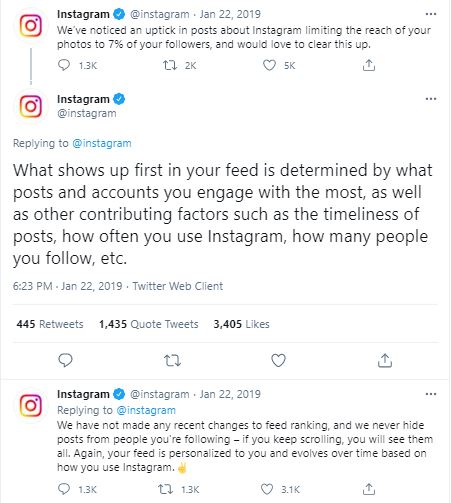
Similar to Facebook, when opening or refreshing your feed on Instagram, the “photos and videos” that Instagram expects you to “care about most will appear towards the top of your feed.”
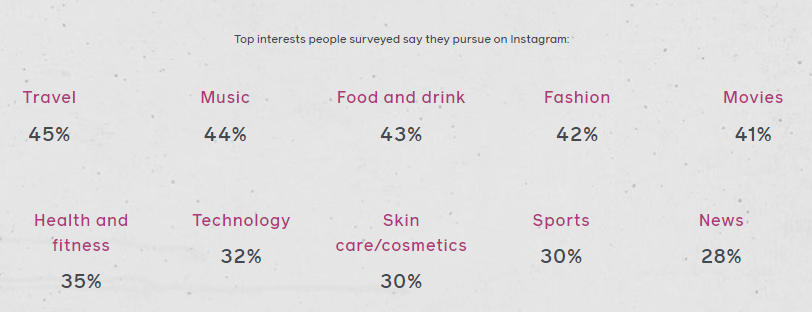
To best understand the mechanics of how the Instagram algorithm works to deliver that content they expect you to “care about most,” we must first understand machine learning, which the algorithm relies on to consistently evolve.
While we might typically think of heavy, metal, mechanical things when we hear the word “machine,” one of the greatest machines of all is the human brain. Our brain continues to absorb and process information every minute of every day, with many of the decisions we make (and don’t make) being informed by past learnings. Whether consciously or unconsciously, this database of information stored in our brains helps to protect us and help us evolve. We can better know what to say and do, and not say or do in the future, based on the information our brain has already gathered.
“Machine learning is a method of data analysis that automates analytical model building. It is a branch of artificial intelligence based on the idea that systems can learn from data, identify patterns and make decisions with minimal human intervention.”
In short – machine learning does the heavy lifting. But the human mind is still the first – and most important machine – in crafting an algorithm. It is people who decide which data to consider, and which results should be generated from that data. And at Instagram, similar to its parent company Facebook, the most important ranking signals include:
These signals are applied to Instagram ads as well as organic posts. “We want to show you ads from businesses that are interesting and relevant to you, and to do that we may use information about what you do on Instagram and Facebook (our parent company) as well as your activity on third-party sites and apps you use.”
By its nature, the algorithm is always changing as it responds to more user behavior insights over time, helping it to get ‘smarter’ and more accurate. But it’s important to remember that even as improvements are continually made, the foundation of how and why content is displayed is not constantly being overhauled. By focusing more heavily on meeting the goals of the Instagram algorithm, your strategy will naturally be ever-fresh, experimental, and valuable to your followers.
Additional Considerations
Interest, recency, and relationship to the posting account are the three primary signals Instagram uses in determining which content to show in your feed, but there are three additional aspects to consider that can affect the likelihood of your content being seen:
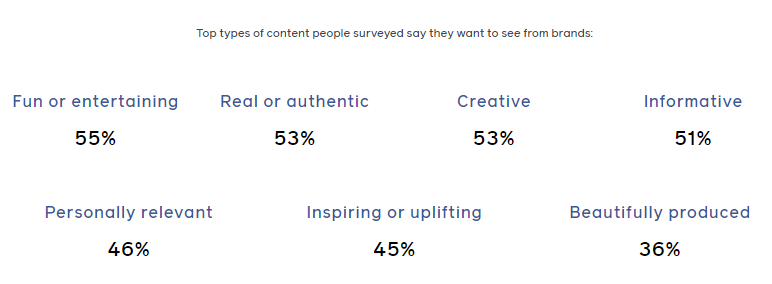
With the 3 primary criteria of the algorithm’s considerations outlined, the real work begins in creating content that answers for each. Let’s dive into them individually:
Likelihood of Interest
Of the 3 primary signals Instagram considers in determining which content to display, likelihood of interest is certainly the most complex, as it is considering an ever-increasing database of user behavior in personalizing each individual user’s feed. However, it is also arguably the most important signal, as the overarching goal of the algorithm is to show users what they actually want to see.
Luckily, though the signal itself is packed with complexity, Instagram does provide creators and brands with a robust arsenal of tools and features to create content that is diverse, engaging, and eye-catching. Let’s start by taking a look at the types of posts you can create:
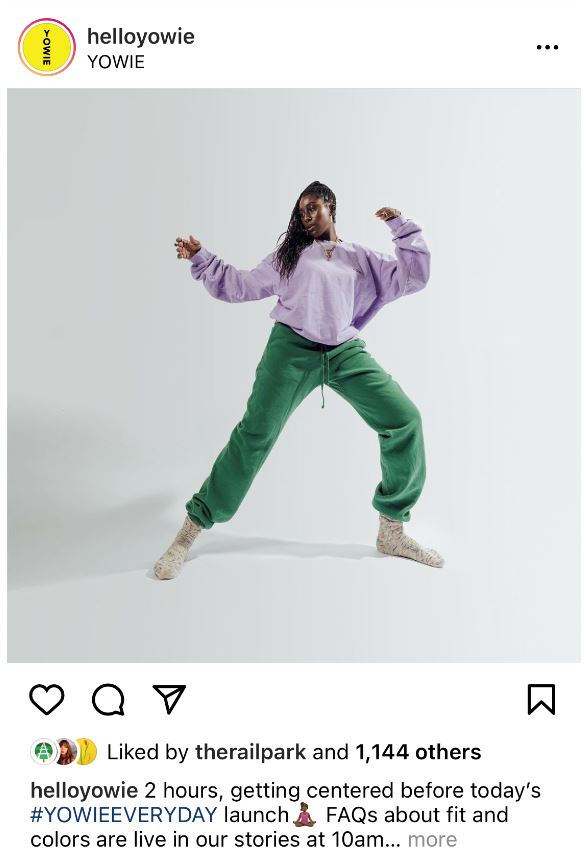
Individual photos is what started it all, and browsing your own Instagram feed, you’re likely to find it’s still among the most popular post types. But not all individual photos are created equal, and they don’t all have to be the same type of photo. Mix things up with high-quality product photos, lifestyle photos, collages, shared photos from followers (always tagging them!), and more.
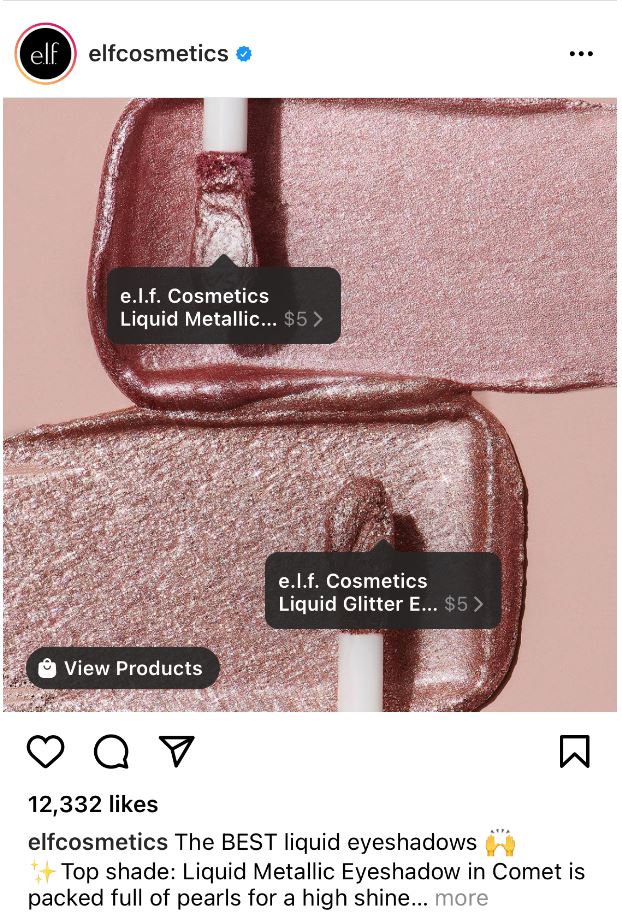
If you have been approved for Instagram Shopping and have completed your setup, you can also tag your products in your posts. This makes it easy for followers to find and purchase the products they like best without having to hunt around for them on your website.

While it’s been said that a “picture is worth a thousand words,” sometimes even a thousand words is simply not enough. Instagram’s photo carousel option gives creators and brands the opportunity to add up to 10 individual images in one post, with dots at the bottom of the first photo shown indicating there are others to scroll through, and a total photo count in the upper right corner.
Carousels give you a great opportunity to tell a story with your post, guiding users further into the narrative with each successive swipe.
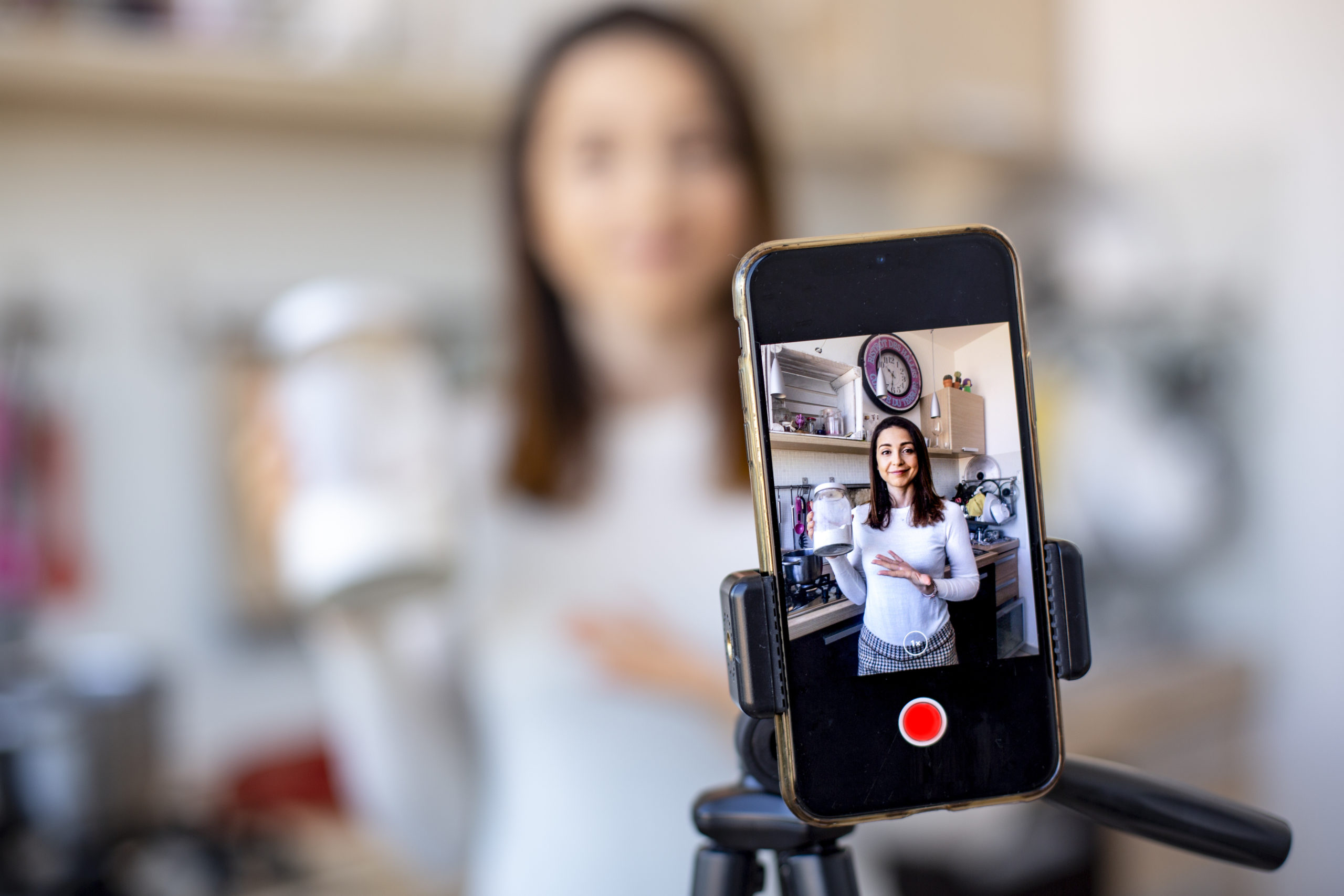
Simply put, consumers LOVE video content, and studies show the interest and demand is only increasing, with 54% saying they would like to see more video content from their favorite brands and businesses. Our eyes are naturally drawn toward movement, and video presents an easy opportunity to get things moving on Insta.
Instagram offers several video options users, creators, and advertisers can leverage:
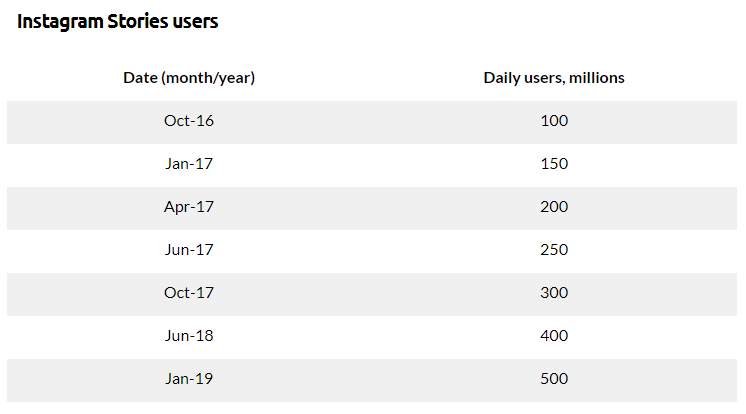
Many creators and brands focus the majority of their Instagram marketing efforts on posts in the Feed, but the popularity of Stories has only continued to grow over time. While the Feed content is undeniably important, it’s crucial to not think of Feed vs. Stories as an either-or – there is plenty of room and reason to leverage both.
Similar to the algorithm for the Instagram feed, more prominent placement is given in users’ Stories based on their likelihood of interest, history with the posting account, and timeliness. However, location also plays a role in Stories. “Users are also shown Stories by location, which is why using location hashtags in Stories is becoming more common.”
While including location-based information won’t make sense for all of your content, we encourage you to include it in situations where it does. One example might be if your brand is hosting a pop-up shop in NYC this weekend. To attract users who might be interested in attending, consider the hashtags someone might search when looking for weekend plans, such as: #nycshopping, #nycpopup, #nycweekend, and #nycthingstodo.
One of the latest Instagram features, Reels is a fresh, user-friendly, energetic approach to video content. Reels can appear within users’ feeds, and are also accessible to sort through by clicking the Reels icon in your bottom navigation.
Reels give users opportunity to “create and edit fun videos that you want to share on Instagram…directly within Instagram.” You can add eye-catching “stickers” and incorporate music to make for a multi-sensory brand experience. Not sure where to start? Check out these tips from Instagram’s creators account for making a successful Reel.
Even if the launch of new post types or features doesn’t apply to your brand itself, those features can help encourage users to use the app more frequently – and for longer periods of time – which influences their likelihood of seeing your Instagram ads or organic posts. Recent examples include bridging Facebook and Instagram messaging, and the launch of Watch Together, which makes it possible to watch videos on Instagram and Messenger along with family and friends.
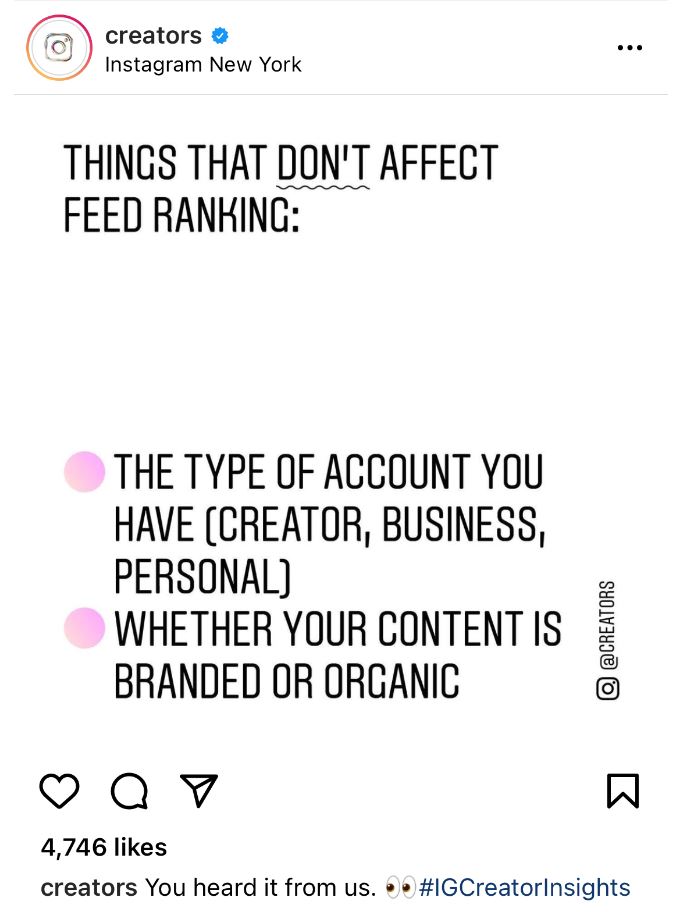
Despite much speculation to the contrary over the years, Instagram has shared that they do not give priority to posts based solely on the type of account that posted them (ie. Creator vs. Business), or based on the type of content unto itself. However, user preferences very much influence such results.
In example, while videos are not more likely to be shown than photos on the whole, they can be more likely to be shown if an individual users’ behavior has indicated they prefer video content. This isn’t an instance of the algorithm itself favoring video content, rather the algorithm analyzing which content each individual user prefers. That’s what makes it so essential to vary the post types you create to increase visibility in light of those variables that are outside your control.
Date and Time of Posting
We’re all familiar with the proverb that “timing is everything,” and that is true on social media as well. While timing doesn’t play as big of a visibility role as it did when Instagram sorted posts reverse-chronologically, priority is still given to newer posts when a user first opens Instagram, or refreshes their feed. With this in mind, you’ll want to post when your followers are most active.
Instagram business profiles offer a valuable Professional Dashboard to provide you with information on your followers, your content performance, and more. Within Insights, you can navigate to Audience to see when the greatest number of your followers are active on Instagram, and design a posting schedule in line with that information.
In addition to taking advantage of Instagram’s built-in analytics, it can also be helpful to keep an eye on how your competitors’ posts perform when they post at different times. Do they get more comments in the morning, afternoon, or evening? More likes around lunchtime, or near the end of the workday? Naturally, their followers won’t all be the same as yours, but you can test what works for them and see if you see similar results.
We encourage you to experiment with posting at different times of day, and on different days, to see which are the ‘magic hours’ for meeting your particular goals. Lean on scheduling your Instagram posts and Stories to meet those ideal posting times without working around the clock. As for where to start, consider these best times to post on Instagram, broken out by industry.
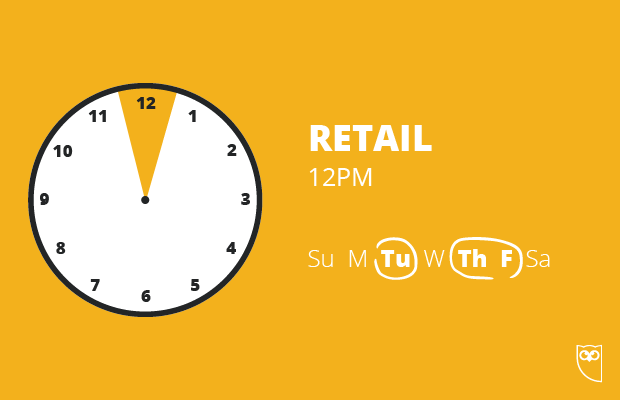
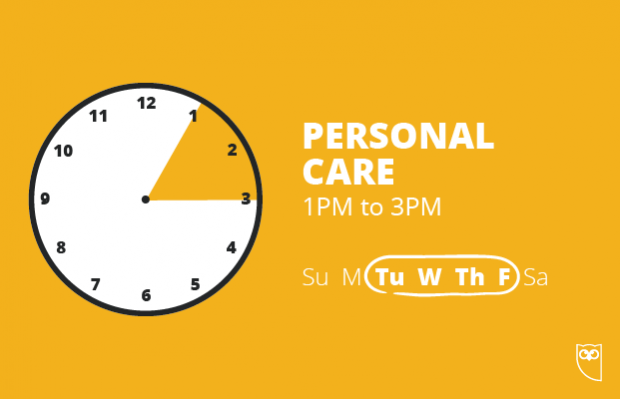
Previous Interactions with the Account that Posted

This is one that will naturally take time to influence, but it’s always ‘running in the background’ so to speak with every post that you make, as your primary goal in all content you create is to encourage interaction.
As users take advantage of the myriad ways to interact with your account – which can be something concrete like liking or commenting on a post, or something more simple, like lingering on a photo and caption – their total interactions with your account continue to climb. This builds on the likelihood that they will see your content more regularly.
With more than 1 billion users on Instagram, it might make more sense to ask who isn’t using the platform. But there are some high-level metrics that can be valuable to keep in mind when crafting your Instagram marketing strategy. These include:
This is a question we’ve heard time and again from people hoping there’s a workaround to outsmarting the social media giants whose rules we are bound to, but we encourage a different mindset that will make better use of your time, energy, and advertising spend.
It’s important to remember that the algorithms themselves are not your enemy. While it is natural to want to beat, outsmart, or hack the Instagram algorithm for immediate results, learning how to work with the algorithm’s rules will help you realize the greatest chance at lasting social media success.
Instagram is a Business, Too
Just as there are certain rules you follow to safeguard and grow your business – encouraging repeat customers by providing quality services or products that answer for their needs – Instagram and other social media platforms are businesses of their own, with their own ‘customers’ to satisfy.
In crafting the ideal algorithm, platforms like Instagram invest a lot of time and money of their own to best understand how to keep users engaged on their platform, and more likely to use that platform regularly, and for longer periods of time. Thinking of the algorithm from their point of view, you’ll find their goals actually align with your own goals. The greater the number of total users logging in regularly for greater lengths of time, the more opportunity advertisers have to reach those users through organic and paid social posting.
In a sense, the Instagram algorithm is a living thing, constantly learning and evolving based on those learnings. And your organic and paid Instagram campaigns need to be a living thing as well.
Ready to take your Instagram campaign to the next level? Contact us today to learn how our social media experts can help you gear up for the ‘gram.
Additional Instagram Resources
Instagram Explore: How to Take Advantage of 6678% YoY Impressions
What Are Instagram Reels?
Social Commerce: The Ultimate Guide to Every Shoppable Channel
Facebook Launches Shops, an Ecommerce Platform for Facebook and Instagram
Instagram Story Ads Guide + 8 Design Tips To Boost Conversions
The Ultimate List of Instagram Tools – Analytics, Scheduling, Influencers, and More
